Building Generational Wealth Through Homeownership
Owning a home has long been considered a reliable way to build wealth and achieve financial stability. For many, it is the cornerstone of the American Dream, offering not just a place to live but also a means to build equity, save for the future, and pass down assets to the next generation.
This guide will walk you through how homeownership can boost a family's wealth over time. It covers four ways to grow your wealth, three essential tips for sustainable homeownership, three hidden benefits you might not expect, and an inside look at what it's like to own a home through Twin Cities Habitat’s Homeownership Program.
Four Ways Homeownership Builds Generational Wealth
Changes in the United States’ tax code, inheritance laws, and banking systems have generated financial incentives and rewards to people who own property and homes.
To see if you might benefit, first understand the idea of equity, the history of real estate values, the tax savings available to homeowners, and the opportunities to develop multi-generational wealth through inheritances.
Equity Equals Ownership
Equity is an ownership stake in something. It doesn’t necessarily mean outright ownership.
- For instance, if you pay 20% of a house’s value as a down payment, you immediately have a 20% ownership stake after closing. You would own 20% of the equity in the home.
- If you put 3% down instead, you would only have 3% of the equity. If you put nothing down, you would have no equity.
- The people who offer you a mortgage hold the rest of the equity.
This is one of the key things to understand about buying a home. Your down payment, along with the specifics of your mortgage, will determine how much equity you have at the start–and how quickly you accumulate more as you make monthly payments.
It’s important to consider how much of a down payment you can make on your first home. Many people believe 20% down is required to buy a home, and that’s often more than people can afford. You actually don’t need 20% down to buy a home. There are also many down payment assistance options available to help you buy your first home.
Increasing Value of Homes
Monthly mortgage payments are not the only thing that affects home equity. If a home increases in value after you buy it, you have more equity—at least on paper. Keep in mind, however, that you wouldn’t receive that increased value unless you sold the home for that higher price.
With few exceptions, , like the housing bubble between 2006 and 2011, home prices generally increase over time. This is due to both inflation and the impact of supply and demand for homes.
Population growth means more homes must be built to keep up with demand. Minnesota dramatically underbuilt the number of homes it needed to keep up with population growth following the housing bubble, so demand pushed home prices up–and will likely continue to do so until the supply rises.
Inflation generally increases both prices and wages. If you buy a home with a fixed-rate mortgage, it will require a certain percentage of your income each month. Over time, you will hopefully (and likely) make more money, in part because of inflation. This will help make your mortgage more affordable relative to your future income.
This is not likely the case for rent. Rents generally rise with inflation and continue to consume the same percentage of your income (approximately) each year.
| Year | Average Home Sales Price in Minneapolis |
|---|---|
| 2018 | $233,000 |
| 2019 | $259,000 |
| 2020 | $269,950 |
| 2021 | $294,250 |
| 2022 | $309,618 |
| 2023 | $324,843 |
| 2024 | $351,000 |
Source: https://www.redfin.com/city/10943/MN/Minneapolis/housing-market
Resource: Twin Cities Housing Market Outlook For 2024
Tax Savings for Homeowners
There are several ways homebuyers and homeowners can save money on their taxes. One of the biggest ongoing benefits is the mortgage interest deduction. People with mortgages can deduct the interest they pay each year from their taxable income (if they itemize their deductions). This can save you thousands of dollars over the life of a mortgage.
Homeowners may also be able to save on their taxes by deducting their property tax.
Note: Deduction of state and local income, sales, and property taxes is limited to a combined total deduction of $10,000 a year. See the IRS website for more details.
Buying or selling a home can also create unique tax-saving opportunities. If you pay mortgage points to lower your interest rate when you buy, you can deduct those costs. And when you sell, you can deduct the cost of any home improvements–for things like finishing a basement, adding an extra room, or replacing the roof.
Perhaps the best tax advantage of homeownership—and the one that really makes wealth creation easier—is not having to pay capital gains taxes on the profits from a home sale. If you have lived in your home for two out of the last five years, the first $250,000 of profit (or $500,000 if you and your spouse file taxes jointly) is exempt from taxes.
- For example, if you bought a home for $300,000, lived in it for 10 years, and sold it for $400,000, you would get $100,000 tax-free (along with all the equity you amassed).
Passing a Home Through Inheritance
A home is the single biggest investment most people ever make. Passing a home on to the next generation is an amazing gift that builds generational wealth.
The new owner receives a “step-up in basis,” which can save money on future taxes. This relates to tax on the proceeds from a home sale. When a person inherits the home, the “original value” is adjusted to the current market value.
- For example, if someone bought a house for $200,000 several decades ago, and the current market value is $300,000, the current value will be the basis for figuring future capital gains. So, if the home was eventually sold for $350,000, capital gains taxes would only be owed on $50,000, not $150,000.
Keep in mind that you avoid paying capital gains on the profits from a home sale if the home has been your primary residence for two of the past five years.
A person who inherits a home with an existing mortgage can take over the mortgage without requiring approval by the lender. This can be extremely beneficial if there is a fixed interest rate on the mortgage.

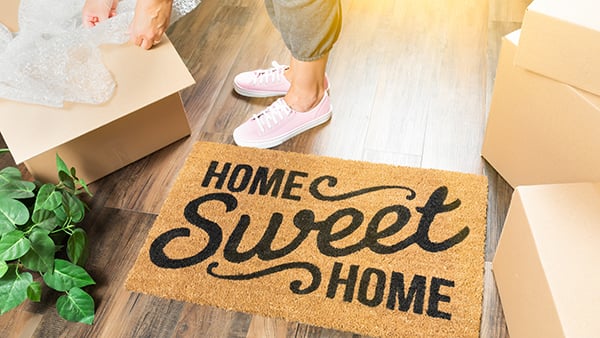
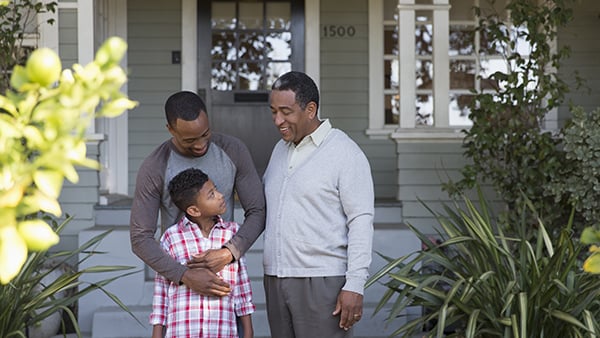
Three Keys to Sustainable Homeownership
Homeownership isn’t a magic remedy that guarantees family wealth accrual. It only works if you are in a sustainable situation where the home is affordable long-term and your investment is protected. The key is getting a mortgage you can afford, protecting your investment with insurance, and maintaining your home so it holds its value.
What Makes A Mortgage Affordable
An affordable mortgage is a must for sustainable homeownership. If you are spending too much on your housing each month, you won't have enough money for other necessities. Historically, your mortgage payments shouldn’t exceed more than 30% of your income.
The monthly payment on your mortgage will be determined by how much money you have borrowed and the loan’s interest rate. Your payment may also include money for property taxes and insurance if you pay those through escrow (which is common).
A lender will look at your credit score, employment history, and other financial information to help you decide how much you can borrow. They will consider your debt-to-income ratio, so try to pay off credit cards and avoid taking on a new car payment if you’re planning to pursue homeownership in the near future. Financial coaching programs can help with this process.
Always think about the long-term affordability of a mortgage. Buying a home is a commitment, and it can be an expensive mistake if you can’t make the payments later. Think about your life situation and whether you will have a stable income enabling you to live in the home years (and maybe decades) from now. This is especially important if you get an adjustable-rate mortgage, which can become more expensive if interest rates increase.
Protect Your Investment
If you buy a home with a mortgage, you’ll need homeowners insurance. Lenders require it, since they own most of the equity in the home. They want to be sure that asset is protected in case of things like a fire.
But even if you own a home outright, insurance still makes sense. If you don’t insure your home, you are taking a massive gamble with your biggest investment. Insurance can help you rebuild if your home is destroyed by a fire, or if your roof is damaged from storms. Insurance can also help cover the costs of legal fees if someone is injured in your home.
You can also protect yourself financially by getting a comprehensive home inspection before buying the home. A trained professional can spot things that could become expensive problems in the future. They will look for things like water damage, mold, a bad roof, foundation cracks, or HVAC and electrical system issues. An inspection is critical to start your home-owning experience off right.
Maintain Your Investment
A home has value to you because you can live in it. But it only has value to others if you can sell it. Homes in bad shape can quickly lose their value, so part of buying a home is being ready to maintain it.
- Expect to spend about 1% of a home’s value on maintenance each year. Some years it’ll be less, and some years you’ll have major expenses, like a new furnace.
- Make sure to do maintenance work regularly. In Minnesota, this means getting a home ready for winter (which includes many things that can be done for free or low cost).
- You also need to keep the yard and exterior in good shape and fix minor things before they become big problems (this is especially true for plumbing).Pets can be a loving addition to a home, but they can also destroy one. Make sure to pet-proof your home as much as you can, so it doesn’t sustain any permanent damage.
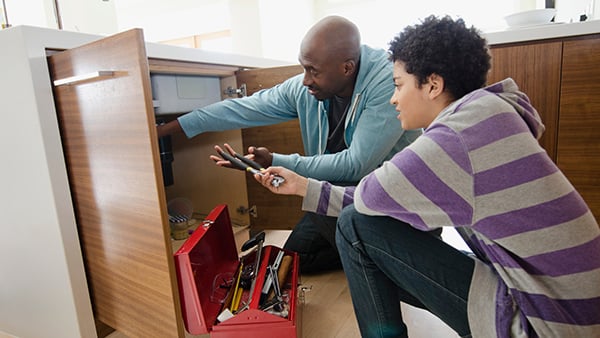
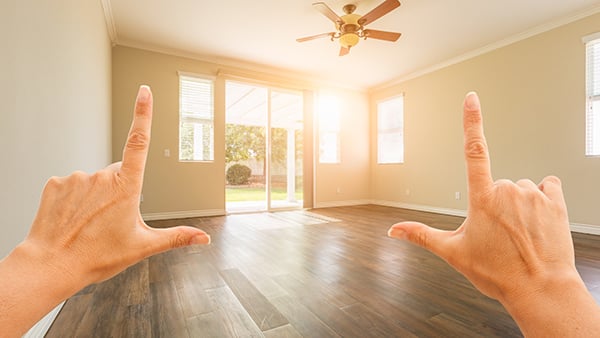

Three Hidden Benefits of Homeownership
Owning a home can be a pathway to greater financial strength for a family, but there are other tangible benefits. Stable housing makes families more resilient to hardships, can improve overall health, and opens the door to more education and employment opportunities.
Stability During Challenging Times
Consider the advantages owning a home had during the pandemic. A home generally provides more space for a family than an apartment. This makes it easier to work from home or take in family or friends who need a place to stay.
Twin Cities Habitat for Humanity has been partnering with families to purchase homes affordably since 1985, and staff often hear stories of how a home has helped a family navigate a challenging time. Here are a few of those stories:
A Chance for Better Health
Several studies have found a link between homeownership and improved health outcomes for families. It impacts things like respiratory illness rates, mental health, and exposure to harmful chemicals.
“A safe, decent, affordable home is like a vaccine. It literally prevents disease. A safe home can prevent mental health and developmental problems; a decent home may prevent asthma or lead poisoning; and an affordable home can prevent stunted growth and unnecessary hospitalizations.”
— Dr. Megan Sandel, Associate Professor, Pediatrics, at Boston University School of Medicine, testifying before Congress.
A Chance for Greater Success
Healthier kids do better in school, but that’s not the only educational benefit linked to homeownership. Research has shown that the following are also true:
- Children in homeownership situations achieve better education outcomes, including high school completion and college attendance, than children in rental households.
- The benefits associated with homeownership are especially strong for low-income households.
- An affordable mortgage means parents don’t have to work second or third jobs and can spend more time with their family.
The benefits of homeownership extend far beyond simply having a place to live—they can transform lives and improve education and overall well-being. However, these benefits have not always been within reach for everyone, particularly with communities of color.
To create a more equitable future, we must address the barriers that have historically limited access to homeownership. This is where Twin Cities Habitat for Humanity steps in, offering a pathway to homeownership that prioritizes long-term affordability and lasting impact for everyone.
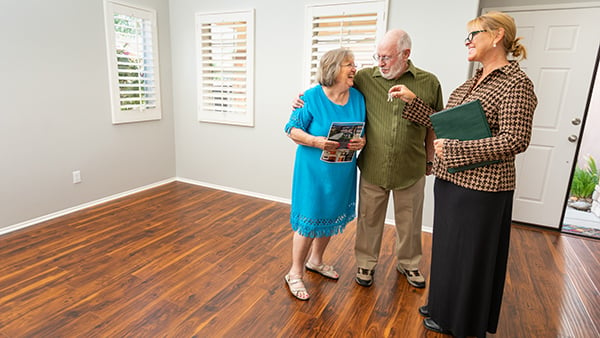
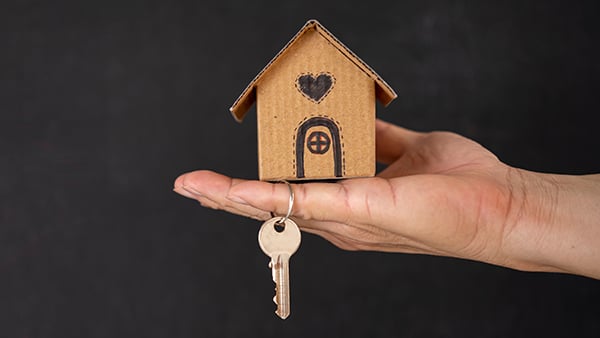

Buying Your First Home: How Twin Cities Habitat Can Help
At Twin Cities Habitat for Humanity, our broader mission is to create more equitable access to homeownership for all, specifically addressing the historical and systemic barriers that have disproportionately affected Black families. Here’s how we are making a difference:
- Homeownership Counseling and Education: We provide comprehensive homeownership education and counseling services. This includes financial coaching, credit repair assistance, and guidance through the homebuying process, helping to ensure that families are better prepared for sustainable homeownership.
- Affordable Homeownership Programs: Through our affordable homeownership programs, we offer homes at prices that are accessible to low- and moderate-income families. We use models like long-term affordability (LTA) and shared equity to keep homes affordable for future generations, ensuring that more families can not only purchase homes and also build wealth over time.
- Advocacy for Racial Equity in Housing: We are involved in advocacy efforts to address racial disparities in housing at both the local and national levels. We support policies and initiatives that aim to dismantle discriminatory practices and promote fair housing for all.
Buying your first home is an exciting yet huge decision that you should not make lightly. If done correctly, it can be an opportunity to increase your family’s financial security and grow wealth. While homeownership is possible for everyone, not everyone’s timeline is the same. Here are some signs that you may be ready for homeownership:
- Your income is stable and your debt is manageable: Any lender should consider your debt-to-income ratio before they offer you a mortgage. You can calculate it by dividing your monthly debt by your monthly gross income. See what your debt-to-income ratio must be below in order to qualify to buy a home with Twin Cities Habitat for Humanity by visiting the TruePath Mortgage page.
- You aren’t planning on moving anytime soon: There’s guidance that says you should plan to stay a minimum of five years in a home in order to make the process worth it at all. Each situation will be different, but the longer you know you won’t be moving the better your chances are for homeownership to benefit your family.
- There are homes you’d be happy with in your price range: You can have the initial conversation with a lender to see how much you would be able to afford and then research online if there are homes in that price range in areas you’d like to live or connect with a local Realtor for assistance. This will give you a good sense of whether homeownership is viable for you now.
- You are ready for the responsibilities of homeownership: It’s not just the money (although you need to be prepared to pay for regular maintenance projects). There are things like doing your own yard work, shoveling, and handling anything that does go wrong with your home. It’s going to be more work than renting.
Homeownership is more than just a financial investment—it's a powerful tool for building generational wealth, improving health, and creating opportunities for success. For more detailed information on how to navigate the homebuying process be sure to check out our First-Time Homebuyer Guide. It’s packed with valuable insights and practical tips to help you on your journey to homeownership.
